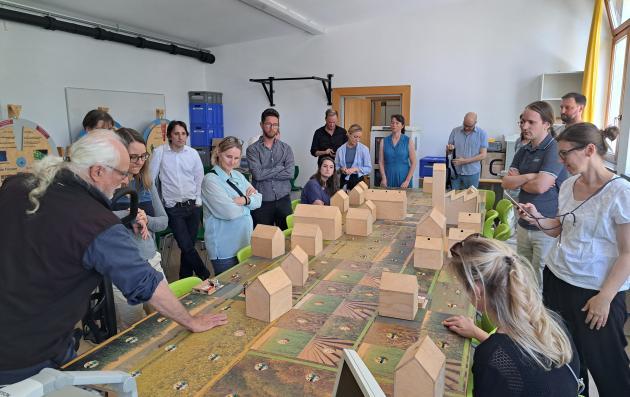Date of label : 29/10/2024
-
Munich , Germany
-
Size of city : 1.594.632 inhabitants

The image captures a moment from a sustainability-focused workshop, highlighting the collaboration between educational and environmental authorities.
Summary
In a participatory process that ran from 2019 to 2022, the City of Munich (DE), together with around 150 individuals from administrations, academia, civil society, and educational institutions, developed a comprehensive strategy for the structural integration of Education for Sustainable Development (ESD) into the educational landscape in Munich. The result is the BNE VISION 2030: an action programme with around 350 measures that was adopted by the Munich City Council in 2022, and is to be implemented by 2030. By integrating ESD into all educational sectors, from early childhood to adult education, Munich is making a significant contribution to the implementation of the UNESCO programme ‘ESD for 2030 - Towards achieving the SDGs’ at the municipal level.
The solutions offered by the Good Practice
Munich has long recognised the impacts of its actions, both locally and globally. In 2016, Mayor Dieter Reiter signed the resolution of the German Association of Cities on the UN’s 2030 Agenda, committing Munich to implement the 17 Sustainable Development Goals (SDGs). The city also aims to become climate-neutral by 2035. Achieving these goals requires the participation and empowerment of the entire city.
In 2018, the City Council commissioned the Department for Education and Sports and the Department for Climate and Environmental Protection to develop an Education for Sustainable Development (ESD) strategy. ESD is a holistic concept that enables people to make informed decisions and act responsibly for environmental protection, a sustainable economy, and a fair society. Munich’s ESD concept, titled BNE VISION 2030, was developed through a participatory process, with city departments, ESD experts, and educators. The initiative aims to anchor ESD in all areas of education and the city administration.
BNE VISION 2030 is part of the ‘Guideline Education’, which is a key component of the strategic urban development concept ‘Perspective Munich’. By committing to ESD, Munich aspires to be a model city for others to follow in promoting sustainability and protecting the planet.
Building on the sustainable and integrated urban approach
Education for Sustainable Development (ESD) refers to a holistic education concept that enables learners to make informed decisions and act responsibly to protect the environment, promote sustainable economies, and build a just society for current and future generations in the face of global, ecological, economic, and social challenges.
The practice addresses various sustainability issues, and their interactions and trade-offs. By embedding ESD in municipal educational programmes, learners of all ages and social backgrounds can be reached, and equipped with the skills needed to contribute to sustainable solutions for global and local challenges.
Based on participatory approach
To ensure a participatory process, a development workshop in spring 2019 involved around 20 key stakeholders from different sectors. Together, they created the process structure, gathered ideas, and identified actors to be involved. Following the educational areas of the National Action Plan for ESD, seven working groups were formed each with around 20 experts. To enable a cooperative city-wide approach, beyond just an administrative one, every working group was co-led by representatives from the administration and from civil society or an independent organisation.
To maintain the successful cross-departmental and participatory approach, an advisory group was set up to support, guide and update the BNE VISION 2030 process. This accompanying group was designed with various key actors, and included members of the administration, civil society, and academics.
Annual public events were also held, for Munich residents to stay informed and share their ideas, even if they were not actively involved in the project’s development.
What difference has it made?
In addition to its extensive action programme with concrete measures, the development process of the BNE VISION 2030 has enhanced networking among different educational actors in Munich, and strengthened the trustful cooperation between the administration and civil society.
Awareness of Education for Sustainable Development (ESD), and its importance for achieving sustainability goals has increased significantly among local authorities, educators, and politicians. Many small and large projects and measures have been successfully implemented, including the creation of new advisory positions in the administration to support educational institutions regarding ESD implementation. Resources were also allocated for ESD-appointed teachers, benefitting nearly 120 municipal schools in Munich.
Why this Good Practice should be transferred to other cities
The goal of ESD is to build the skills needed for sustainable societal development. Embedding ESD at the municipal level enables citizens to acquire relevant knowledge and skills throughout their lives, fostering the shift in awareness and behaviour necessary for achieving sustainability goals.
The BNE VISION 2030 exemplifies the development of a strategic action plan for ESD at the municipal level. It helps implement:
- The UN Sustainable Development Goals (SDGs), especially SDG 4 (Quality education).
- The National Action Plan for ESD, which incorporates the international UNESCO-Roadmap ‘ESD for 2030’ for Germany.
Although the specific measures of the BNE VISION 2030 are specific to Munich's educational landscape, the process of creating the action programme can serve as a blueprint for other cities looking to develop an ESD strategy.
Successful transfer of this practice requires:
- The identification of key stakeholders to actively participate in developing an ESD strategy, and to bring practical expertise.
- Support and a clear mandate from the municipal leadership level.
- The necessary personnel and financial resources.
As part of a national network of ESD model cities, Munich shares its experiences widely. The BNE VISION 2030 was presented at the Autumn Conference 2022 of the ESD Competence Centre, and via numerous forums, events and exchanges with other cities. The BNE VISION 2030 was also featured in the handbook ‘Designing ESD in Municipalities’.
